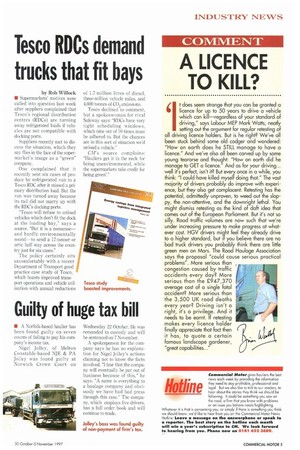• Supermarkets' motives were called into question last week after
Page 7

If you've noticed an error in this article please click here to report it so we can fix it.
suppliers complained that Tesco's regional distribution centres (RUCs) are turning away refrigerated loads if vehicles are not compatible with docking ports.
Suppliers recently met to discuss the situation, which they say flies in the face of the supermarket's image as a "green" company.
One complained that it recently sent six cases of produce by refrigerated van to a Tesco RDC after it missed a primary distribution load. But the van was turned away because its tail did not marry up with the RDC's docking ports.
"Tesco will refuse to unload vehicles which don't fit the dock at the loading bay," says a source. "But it is a nonsense— and hardly environmentally sound—to send a 17-tonner or artic half way across the country just for six cases."
The policy certainly sits uncomfortably with a recent Department of Transport good practice case study of Tesco, which boasts improved transport operations and vehicle utilisation with annual reductions of 1.7-million litres of diesel, three-million vehicle miles, and 4,600 tonnes of CO, emissions.
Tesco declined to comment, but a spokeswoman for rival Safeway says: "RDCs have very tight scheduling windows, which nine out of 10 times must be adhered to. But the chances are in this sort of situation we'd unload a vehicle."
CM's source complains: "Hauliers get it in the neck for being unenvironmental, while the supermarkets take credit for being green'."












































































































